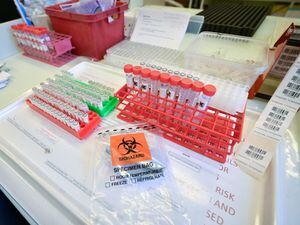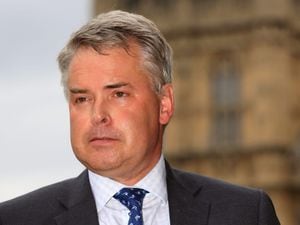Covid-19 death rate ‘more than double’ in most deprived areas
Research also shows London has the highest Covid-19 mortality rate, while south-west England has the lowest.

People living in the most deprived areas of England have experienced coronavirus mortality rates more than double those living in the least deprived areas, new analysis shows.
For those deaths involving Covid-19 that took place between March 1 and April 17, the mortality rate in the most deprived areas was 55.1 deaths per 100,000 population.
By contrast, the rate was 25.3 deaths per 100,000 in the least deprived areas.
The analysis, published by the Office for National Statistics (ONS), also shows the Covid-19 mortality rate in the most deprived areas of England has been higher among men (76.7 deaths per 100,000 population) than women (39.6).

Nick Stripe, ONS head of health analysis, said: “General mortality rates are normally higher in more deprived areas, but so far Covid-19 appears to be taking them higher still.”
Charity leaders say the “worrying trend” reflects how deprived families are more likely to live in cramped housing, with many identified as essential workers who cannot work from home.
David Finch, senior fellow at the Health Foundation, said: “Those facing greater socio-economic disadvantage tend to live in cramped housing conditions and many are now classified as essential workers who don’t have the option of working from home, placing them at higher risk of exposure to Covid-19.
“People living in more deprived areas are also more likely to have one or more long-term health conditions, which means they are at greater risk of suffering severe symptoms from the virus if exposed.”
Helen Barnard, acting director at the Joseph Rowntree Foundation, said: “It’s crucial that all aspects of the spread of this virus are carefully examined, but we know that people in more deprived areas are less likely to have jobs where they can work from home.
“This means they may have to face a very significant drop in income or keep going to work, facing greater risks of catching the virus.
“They are also more likely to live in overcrowded homes, increasing the risk for whole families. This just is not right.”
Imran Hussain, director of policy and campaigns at Action for Children, said: “These figures make clear once again that investing in the nation’s health means tackling poverty, and this is just as much a priority as funding the NHS.
“Those on low incomes are more likely not only to have poorer underlying health but also work in jobs that put them at greater risk of exposure to the coronavirus.”

Shadow health secretary Jonathan Ashworth said: “This is a devastating confirmation that the virus thrives on inequality, with people living in more deprived areas seeing Covid-19 mortality rates more than double those in less deprived areas.
“Labour has long warned of shameful health inequalities which mean the poorest contract illness earlier in life and die sooner.
“Covid-19 exacerbates existing inequalities in our country. Ministers must target health inequalities with an overarching strategy to tackle the wider social determinants of ill-health.”
The ONS has analysed details of the 20,283 deaths that occurred in England and Wales between March 1 and April 17, and which were registered by April 18, where Covid-19 was mentioned on the death certificate as the underlying cause of death or a contributory factor.
It found that:
– London had the highest Covid-19 age-standardised mortality rate, with 85.7 deaths per 100,000 population; this was statistically significantly higher than any other region and almost double the next highest rate of 43.2 in the West Midlands.
– South-west England had the lowest Covid-19 mortality rate (16.4 deaths per 100,000 population); the rate for Wales was 28.4, while for England and Wales as a whole the rate was 36.2.
– The local authorities with the highest Covid-19 mortality rates were all in London, with Newham having the highest rate (144.3 deaths per 100,000 population) followed by Brent (141.5) and Hackney (127.4).

When examining the impact of deprivation on the Covid-19 mortality rates, the ONS found that in England the rate in the most deprived areas was 118% higher than in the least deprived areas.
This is greater than the difference in the mortality rate for all deaths, which is 88% higher in the least deprived areas.
In Wales, where levels of deprivation are measured differently from England, the ONS found that the most deprived fifth of areas had a Covid-19 mortality rate of 44.6 deaths per 100,000 population.
This is almost twice as high as the rate for the least deprived areas (23.2 deaths per 100,000).
The Covid-19 mortality rate for men in the most deprived fifth areas of Wales was 61.9 deaths per 100,000 population, compared with 32.0 for women.
Mayor of Newham Rokhsana Fiazthe figures were very concerning but not surprising, adding: “We already knew that the virus does not affect all populations in the same way, with Black, Asian and Ethnic Minorities (BAME) already identified as particularly vulnerable, and Newham is a highly diverse borough.
“We also know that there are issues of health inequality in our borough, with high levels of respiratory disease, diabetes and other underlying issues, which affect mortality.
“We also face wealth inequality with 30,000 of our residents not being paid even the basic minimum wage (much less the London Living Wage). There is a danger that this group, and other low paid and front line workers have faced greater exposure to the virus, because of the financial imperative to keep working and not socially isolate.”
Chief executive of children’s charity Barnardo’s, Javed Khan, described the figures as “worrying” but “unfortunately not surprising”.
He said: “This crisis is highlighting deep-rooted inequalities that have been papered over for decades.
“Vulnerable children and families – and those already experiencing disadvantage – risk becoming the forgotten victims.”
A Government spokesman said: “Any death from this disease is a tragedy and we are working incredibly hard, day and night, to protect the nation’s public health.
“We have commissioned urgent work from Public Health England to understand the different factors that may influence the way someone is affected by this virus. We will set out full details in due course.
“We are ensuring financial support for the poorest in society by increasing Universal Credit payments and speeding up the payment of Statutory Sick pay, as well as introducing the Coronavirus job retention scheme, the Self-employment Income Support Scheme, mortgage holidays and greater protection for renters.”





